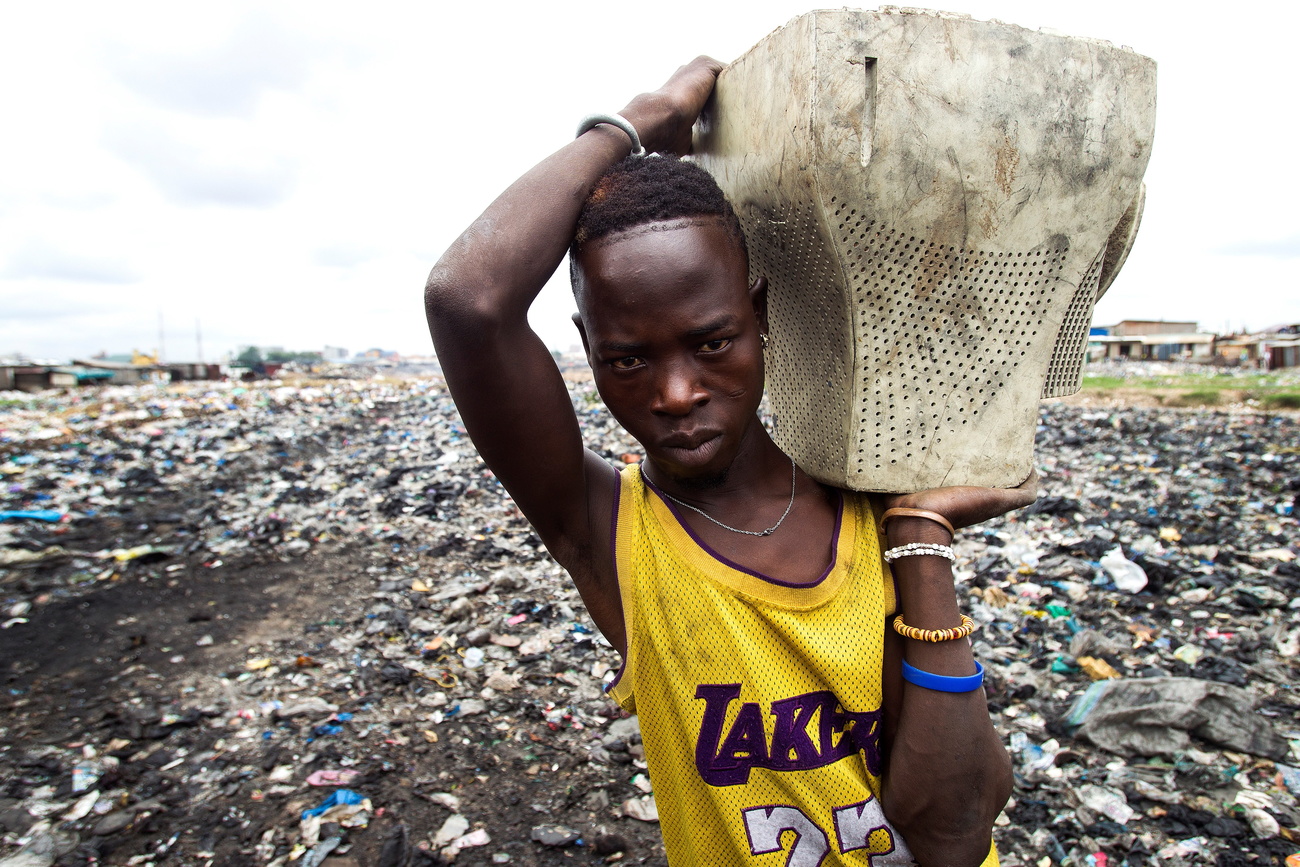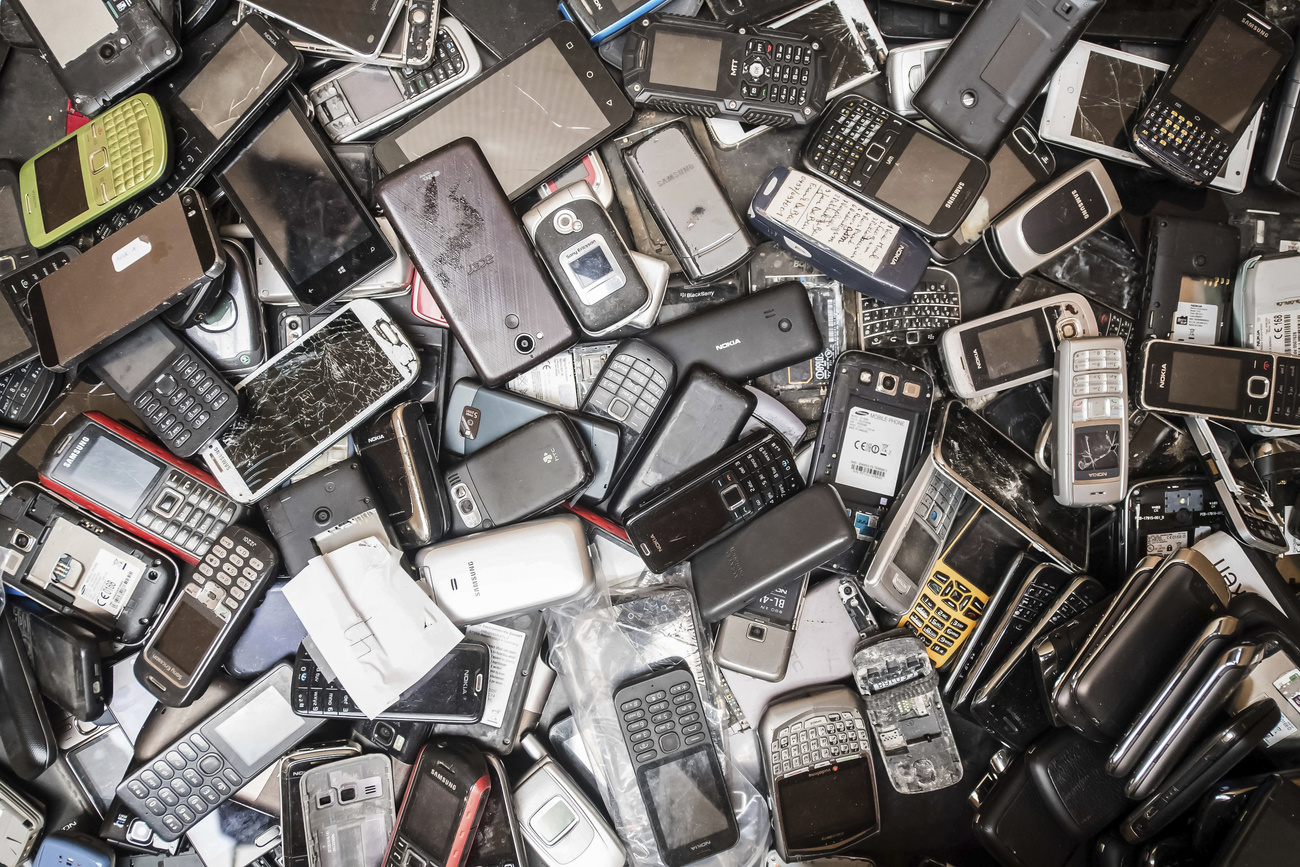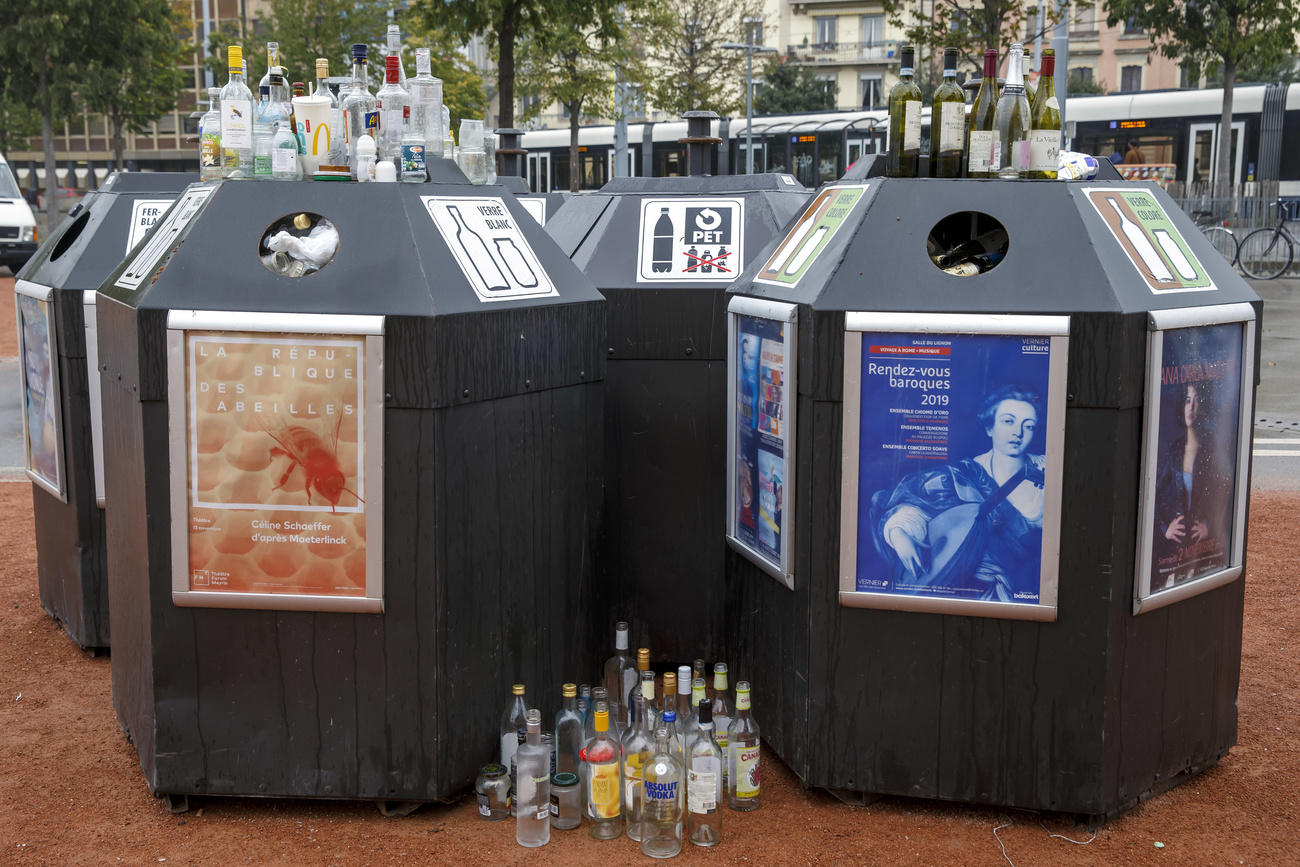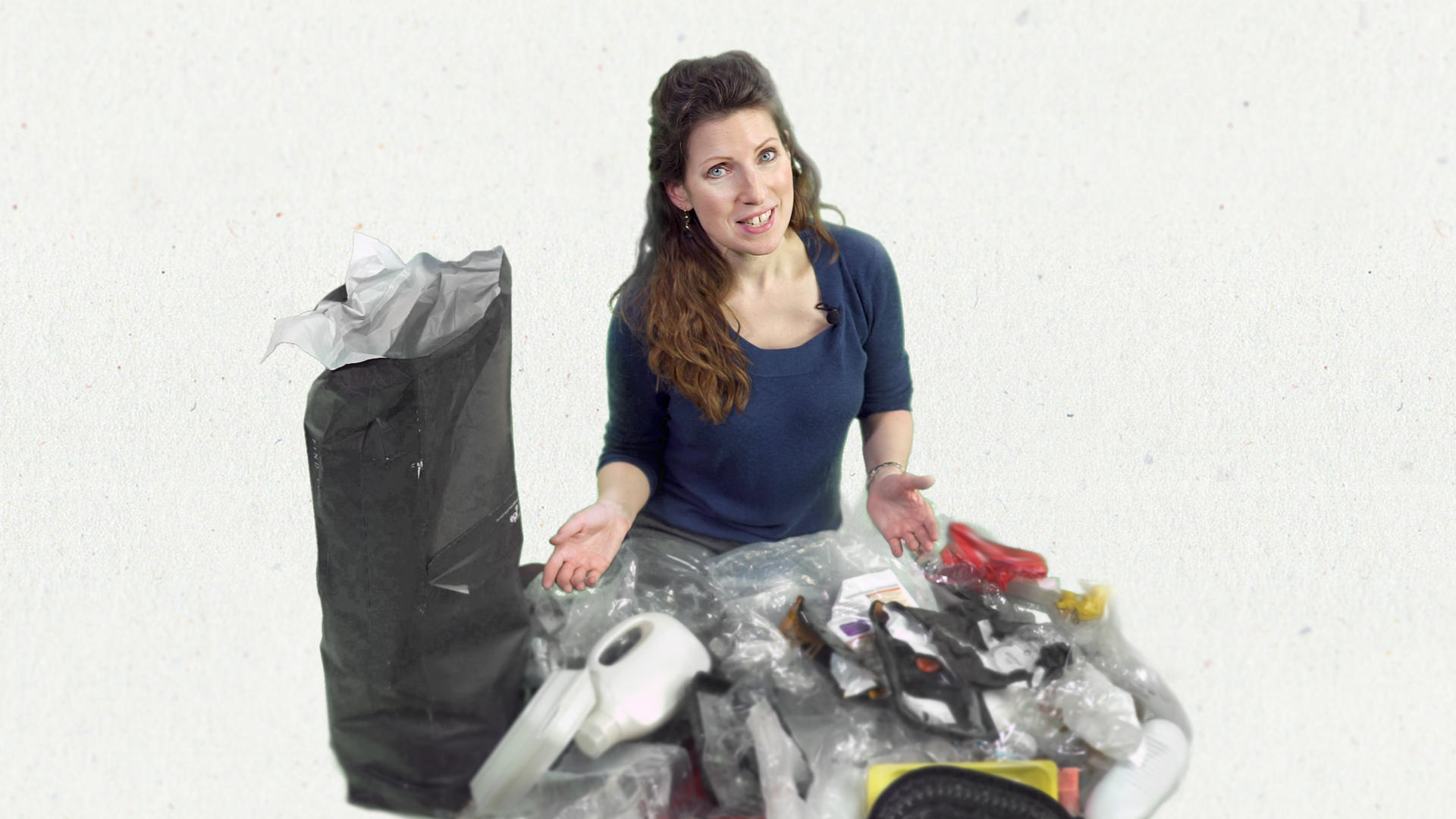The battle against global e-waste dumping reaches tipping point

Switzerland is pushing to modify an international accord so that all electric and electronic waste shipped abroad gets prior consent from destination countries. Not everyone is on board.
The Agbogbloshie dump on the outskirts of Accra in Ghana is where a lot of the world’s electric and electronic waste comes to die. Scavengers sift through discarded washing machines or computers in the hope of extracting meagre amounts of copper, aluminum or even plastic that have not yet been stripped off by others.
Extraction often involves melting the carcasses of microwaves and tumble dryers, a process that releases clouds of toxic smoke and fumes into the surroundings. One man’s treasure is also the same man’s poison.
Some of the e-waste that is burnt in Agbogbloshie includes once-cherished possessions of households in Europe or the United States. It is estimated that around 15% of the 215,000 tonnes of electric and electronic goods imported into Ghana are classified as waste electrical and electronic equipment (WEEE) or e-waste. This includes electrical goods like washing machines and microwaves as well as electronic gadgets like computers and smartphones. They are not meant for repair or refurbishing but can contain valuable metals. This is allowed as long as the WEEE does not contain hazardous substances.
However, 85% of imported goods that end up in Agbogbloshie is not e-waste but what is known as used electric and electronic equipment (UEEE), like an old model smartphone or one with a broken screen. The high cost of repairing or recycling broken-down or obsolete goods has made it an attractive option to ship them to far-flung corners of the world. On paper, they are meant to be repaired and resold as second-hand goods at affordable prices in the destination countries. In reality, most are stripped for their valuable components and metals and dumped in Agbogbloshie for the poorest of the poor to sift through and burn.
“A child who eats just one chicken egg from Agbogbloshie will absorb 220 times the European Food Safety Authority daily limit for intake of chlorinated dioxins,” said Marie-Noel Brune Drisse, lead author of a World Health Organization report called Children and Digital DumpsitesExternal link released last year.
Global agreement
Almost exactly 33 years ago an agreement was adopted in the Swiss city of Basel to prevent this kind of problem. The Basel Convention on the Control of Transboundary Movements of Hazardous Wastes and their Disposal (or Basel Convention) was adopted on March 22, 1989, and became effective on May 5, 1992.
Three decades later, a Swiss-Ghanaian proposal aims to fill some the gaps of the original text. In July, treaty members will decide whether to make it tougher for countries to dump e-waste, even if they do not contain hazardous substances.
The Basel Convention was born as a result of the introduction of tougher environmental regulations in western Europe in the 1970s and 1980s, which led to the dumping of hazardous waste in eastern Europe and further afield. A key step to regulate this toxic trade was a joint proposal from Switzerland and Hungary to the United Nations Environment Programme (UNEP) in 1987. They aimed to draw up an international agreement designed to regulate movement of hazardous waste across borders.
Unlike now, e-waste was not such a huge problem back then. On average, each person generated around 7.3kg of e-waste in 2019 (it was 5.8kg in 2014), according to the Global E-Waste Monitor. This adds up to 53.6 million tonnes in total and is projected to rise to 74.7 million tonnes by the end of this decade. What make it more worrying is that nobody knows where the majority of e-waste ends up. According to the Global E-waste Monitor 2020, only 17.4% of e-waste generated worldwide is collected and treated in an environmentally sound manner, which means the fate of the vast majority (82.6%) is undocumented.
Swiss initiative
Switzerland does not allow the export of waste to developing countries like Ghana (only to the European Union or a group of rich countries that make up the Organisation for Economic Co-operation and Development or OECD). That does not exclude the possibility that e-waste exported to these blocks is not re-exported to Asia or Africa. A 2009 investigation by Greenpeace showed that e-waste from countries like the US, Norway, Denmark and the Netherlands ended up in Ghanaian waste dumps. They were probably exported to Ghana as used equipment or non-hazardous waste – which is legal – but could have also ended up there illegally.
According to the International Telecommunications Union (ITU), e-waste refers to all items of electrical and electronic equipment (EEE) and its parts that have been discarded by its owner as waste without the intent of re-use. E-waste is also referred to as WEEE (Waste Electrical and Electronic Equipment), electronic waste or e-scrap in different regions of the world and under different circumstances. It includes a wide range of products – almost any household or business item with circuitry or electrical components with power or battery supply.
This includes items like personal computers, printers, televisions, mobile phones, refrigerators and air-conditioning. It can be classified as hazardous if it contains toxic materials such as mercury, lead and brominated flame retardants. E-waste may also contain precious metals, such as gold, copper and nickel, and rare materials of strategic value, such as indium and palladium. These precious and heavy metals could be recovered, recycled and used as valuable sources of secondary raw materials.
This lack of traceability was also confirmed by the findings of a project called “Countering WEEE illegal trade”, meant to provide the European Commission, law enforcement authorities, and customs officials information to help tackle the illegal trade of e-waste in and from Europe. The project concluded that an estimated 1,3 million tonnes of e-waste are exported from Europe every year, of which about 30% constitute illegal exports.
The Basel Convention regulates the movements of hazardous and other wastes across borders. Currently only electronic waste classified as hazardous and moved abroad is subject to checks. Electronic waste that is not deemed hazardous does not require any notification. This potentially offers a loophole to dump e-waste in developing countries that may not have the capacity to recycle them in an environmentally sound manner.
To minimise the possibility of this happening, Switzerland along with Ghana submitted a proposal in 2020 that wants to make the prior informed consent of the recipient country mandatory even if the e-waste is classified as non-hazardous. This proposal will be debated in July at the 15th Conference of Parties (COP15) of the Basel Convention this July and adopted if member countries agree.
“If a country wants more control over the influx of e-waste, our proposal will ensure they are better informed and can act more effectively. It is much more difficult to respond when the e-waste has already reached the port than at the pre-export stage,” says Felix Wertli, head of the Global Affairs Section at the Swiss Federal Office for the Environment, which co-drafted the proposal.
Wertli adds that the Swiss-Ghanaian proposal is not dissimilar to the one on plastics that came into force in 2021. Under the new rules, most plastic waste destined for export will require the prior informed consent of recipient countries.
Complex issue
Based on the comments received from member states during the consultation period, it seems that most support the Swiss-Ghanaian proposal on e-waste. However, some countries expressed concern that the move may have unintended consequences on the legitimate export of used electric and electronic equipment for repair and refurbishment.
“Many developing countries import second-hand electrical goods (like radios, tv sets or computers). If this is not illegal, and has a role in supporting the local economy, then there is a need to differentiate between what is obsolete and waste and what is being imported for re-use,” commented Zimbabwe.
This concern has also been echoed by segments of the recycling and scrap industry. The US-based Institute of Scrap Recycling Industries (ISRI) claims that 20% of the business of its American electronics business members is taking used electronics and moving them to another country to either be refurbished or repaired. The US is the only member country that has not ratified the Basel Convention. This means it can freely trade waste not covered by the convention with member countries. However, other countries cannot import waste from the US that is prohibited by the convention.
“There’s a very robust secondary-use market for all electronics: phones, computers, copier machines, etc. If this [proposal] is approved, then the 20% of their business would come under the controls of the Basel Convention, which means that they would have to ask permission of the receiving government before they can make the trade move,” said ISRI Vice-President of Advocacy Adina Renee Adler.
According to her, governments are already overwhelmed with implementing existing waste regulations and there is a backlog of notification requests. She warned that adding non-hazardous e-waste to the list is akin to prohibiting the trade in them due to the administrative burden it will generate.
“Yes, it is an additional effort but it is important for sustainable trade,” argues Wertli.
According to him, the Swiss-Ghanaian proposal will promote higher resource recovery as recipient countries will be able to say no to importing low quality e-waste. This will also improve health conditions for recyclers even in the informal sector.
Waste vs used goods
Others claim that the proposal to make prior informed consent mandatory for non-hazardous e-waste does not go far enough.
“This idea fails to close the real loophole causing so much of the exploitive abuse of developing countries – the export of non-functional electronic equipment, hazardous or not, as ‘non-waste’,” says the NGO Basel Action Network (BAN).
The so-called “repairable loophole” allows traders to export non-functional electrical and electronic equipment by claiming they are not waste because there is an intention to repair them in the destination country. This allows them to skirt restrictions of the Basel Convention altogether.
“Too often these claims prove to be false and the material is simply dumped or found to be unrepairable,” claims BAN.
The European Union has also submitted a proposal that calls for the creation of a new category of waste called “Preparing for reuse”. This would include all materials that end up in rubbish collection centres in the developed world but are then exported with the aim of refurbishing or repairing them so they can be reused in the destination countries. This new category would, in theory, expand the type of used products and equipment that will be categorised as waste, bringing them within the purview of the Basel Convention.
The EU proposal takes a slightly different route compared to the Swiss-Ghanaian one by focusing on reusability. But there is a risk that it goes too far for some members. Amendments to the convention require a three-fourth majority vote to be accepted.
“Destination countries are aware of the impacts of e-waste and want solutions,” says Wertli. “But it is a sensitive issue because there are economic interests and jobs involved.”
The economic value of e-waste has been estimated at $62.5 billion annually, which is more than the gross domestic product (GDP) of 123 countries. For context, more gold can be extracted from a tonne of smartphones than a tonne of gold ore. The number of people involved in the informal e-waste sector is unknown but the International Labour Organization (ILO) estimates the number at around 690,000 in China and up to 100,000 in Nigeria. Both the EU and Swiss-Ghanaian proposals will be up for discussion in July. Their success will depend on acceptance from e-waste importing countries in poorer parts of the world.
“Our proposal is not the perfect solution, nor will it address all the issues of e-waste. However, it is an incremental but significant step in the right direction and towards a circular economy that has a certain chance of being accepted,” says Wertli.

In compliance with the JTI standards
More: SWI swissinfo.ch certified by the Journalism Trust Initiative




You can find an overview of ongoing debates with our journalists here. Please join us!
If you want to start a conversation about a topic raised in this article or want to report factual errors, email us at english@swissinfo.ch.